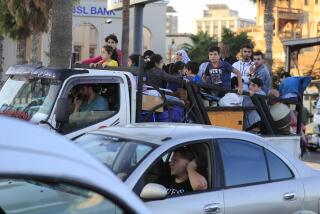Car bombing in Damascus kills 17
DAMASCUS, SYRIA — Mystery surrounded a powerful car bomb explosion Saturday that ripped through a residential neighborhood on the outskirts of Damascus, killing at least 17 people and injuring 14 in the deadliest terrorist attack in Syria in more than two decades.
Official Syrian television channels broadcast images of the blast’s aftermath, including a crushed automobile and the mangled facade of an apartment block with windows blown out. One witness told Syrian television that the bomb was in a sedan.
Security forces quickly cordoned off the area. Witnesses described life-threatening injuries, and the death toll was expected to rise.
Syrian news media quoted sources saying that the vehicle was loaded with more than 400 pounds of explosives and blew up between 8 a.m. and 9 a.m. in a busy pedestrian area often filled with Lebanese, Iraqi or Iranian religious tourists. The area is near an intersection leading to the tomb of Zainab, a daughter of the prophet Muhammad who is especially revered by Islam’s Shiite sect, and a small outpost housing security officials.
The death toll would have been far higher Friday, when mostly Shiite pilgrims finished a religious ceremony near the end of the holy month of Ramadan.
No group immediately claimed responsibility. The official Syrian Arab News Agency reported that a counter-terrorism unit often deployed against Islamic radicals was dispatched to investigate the attack, which bore the hallmarks of Sunni Arab militant groups inspired by or connected to the terrorist network Al Qaeda.
“We cannot accuse any party,” Bassam Abdul-Majid, Syria’s interior minister, told state television, according to Arab news websites. “There are ongoing investigations that will lead us to those who carried it out.”
Terrorist strikes against civilians are rare in Syria, but assassinations have been on the uptick. A Sunni cleric, a ranking security official and Hezbollah military commander Imad Mughniyah were among the prominent figures killed in separate incidents in Syria over the last two years.
The bombing was among the worst attacks in decades. On New Year’s Eve 1997, a still unsolved explosion aboard a Damascus bus killed nine. In 1986, Syria accused Iraqi President Saddam Hussein of masterminding a series of bombings that left at least 140 dead.
Numerous groups could have been responsible for the blast Saturday.
In 2006, Syrian authorities thwarted an attack aimed at the U.S. Embassy in Damascus by gunmen driving a car filled with explosives. In 2004, four people died in a gun battle when suspected Islamic militants attacked a diplomatic district of Damascus.
A spokesman for the Muslim Brotherhood condemned Saturday’s bombing and accused the government’s security apparatus of focusing on political opponents instead of security threats.
“We don’t think there is any group in Syria that can be labeled as ‘terrorist,’ or that can carry out such an operation,” London-based Zoheir Salem told Arabic satellite television channel Al Jazeera.
Tensions have also risen in and around the northern Lebanese city of Tripoli between Sunnis and members of the Alawite sect of Shiite Islam, who are close to the Syrian leadership. Syria recently bolstered security forces along the Lebanese frontier in a move it said was meant to interdict smuggling.
Syrian lawmaker Henein Nemr said he suspected groups in Lebanon were behind the attack. “In Lebanon, billions of dollars are paid for the sake of operations of this kind,” he said in an interview with Al Jazeera.
Security experts and officials in Lebanon and the West have accused Saudi Arabian figures who are close to Lebanon’s Future Movement of funding Sunni militant groups in an effort to counter the power of Hezbollah, the Shiite political and military organization allied with Syria.
Syrians have also been irked by the flood of Iraqi refugees -- as many as 2 million -- who have settled in the country since the 2003 U.S.-led invasion. In addition to concerns that the refugees tax public services and infrastructure, Syrians have worried that Iraqis would bring their now-stifled sectarian civil conflict across the border.
The explosion in February that killed Hezbollah commander Mughniyah was the last bombing attack in Syria. Syrians suspect Israel was behind that killing as well as a 2004 Damascus car bomb that felled a Hamas leader.
--
Times special correspondent Haidar reported from Damascus and Times staff writer Daragahi from Beirut. Noha El-Hennawy of The Times’ Cairo Bureau also contributed to this report.
More to Read
Sign up for Essential California
The most important California stories and recommendations in your inbox every morning.
You may occasionally receive promotional content from the Los Angeles Times.










